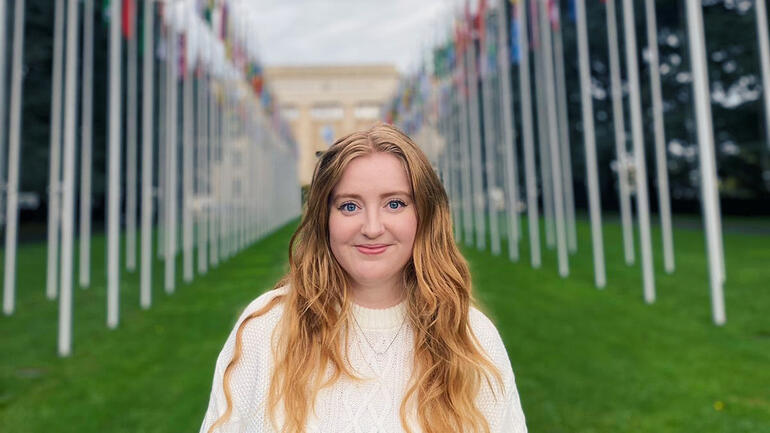A group of students from Master’s in Human Rights and Multiculturalism program spent a week in Geneva alongside Associate Professor Gabriela Mezzanotti meeting various actors in the international sphere and interacting with art and artifacts has left quite a large impact on me. Institutions that once seemed cold and unapproachable now feel accessible and brimming with possibility. Having the opportunity to engage with art and history while learning about career opportunities and current challenges in the field was powerful and strong reminder about the role we all play.
Institution Visits
During the week we met with various inter-governmental organizations, largely connected to the United Nations. We learned and discussed topics as far reaching as technology and human rights, Indigenous rights, migration, trade, and climate change. Each presentation emphasized cooperation between various actors and shared history. Some of my favourite visits included the International Labour Organization and the UN High Commissioner for Refugees.
We met with several diplomats from the Permanent Mission of Norway to the United Nations. This was a particularly helpful visit for me, as someone who had considered a career in diplomacy. The diplomats we engaged with were open and honest about the requirements and skills necessary to excel in these positions. And while it may not be the career for me, I am appreciative to those diplomats for sharing their experiences!
Additionally, we visited a few non-governmental organizations (NGOs) during our time in Geneva. Our visit to the Norwegian Refugee Council was very special to me as the presentations spoke directly about climate change and displacement, my thesis topic. My experience working with NGOs in the past coupled with this meeting makes me very hopeful to continue to work and support this field. While still constrained by mandates, I feel that NGOs have more flexibility to voice concerns and challenge governments.
Other reflections
History often feels flat and devoid of active time. It is paraphrased into large events studied in textbooks and taught in classrooms. Looking at archives brings to life lived reality and smaller actions that played a large role. I (and many others) found myself speechless at this letter from Leon Trotsky, a warning about Joseph Stalin. History does not occur in a vacuum, people have always been watching, advocating, and sounding alarms, those in power didn’t always listen though.
During our site visits, I was intrigued by how many organizations highlighted a piece of art that spoke to a utopian future. I have struggled with feeling that human rights in academia devolves into endless critique, making it difficult to envision a better future. However, I was reminded on this trip the value of art and artistic expression in supporting our visions for a hopeful future. The fact that so many organizations not only had this art prominently displayed but also chose to share its message with us speaks to its role and function. Art should help us aspire to greater things.
We also had the opportunity to visit several museums in Geneva including the Ethnographic Museum (Musée d'ethnographie de Genève) and the International Red Cross and Red Crescent Museum. These visits were great opportunities to learn and re-learn history from new perspectives.
A small highlight for me was this letter giving a passport to one of my favourite authors, Vladimir Nabokov when he was in exile. Knowing this part of Nabokov’s life, I’m interested to see how this framing informs a new reading of his work, particularly Pale Fire. Archival materials also help to ground experiences and processes in reality. It is much easier to learn about the experiences of a stateless person through archival material such as this than through international law.
Key takeaways
My colleagues and I had a very positive time in Geneva. Beyond networking and learning more about these institutions, we were also able to develop deeper relationships with each other over shared meals and group reflections. I am very thankful to have had the opportunity to experience Geneva in this way through this Master’s program, and I am particularly grateful for Gabriela Mezzanotti and her organization of this opportunity and to all the colleagues I experienced this with!
